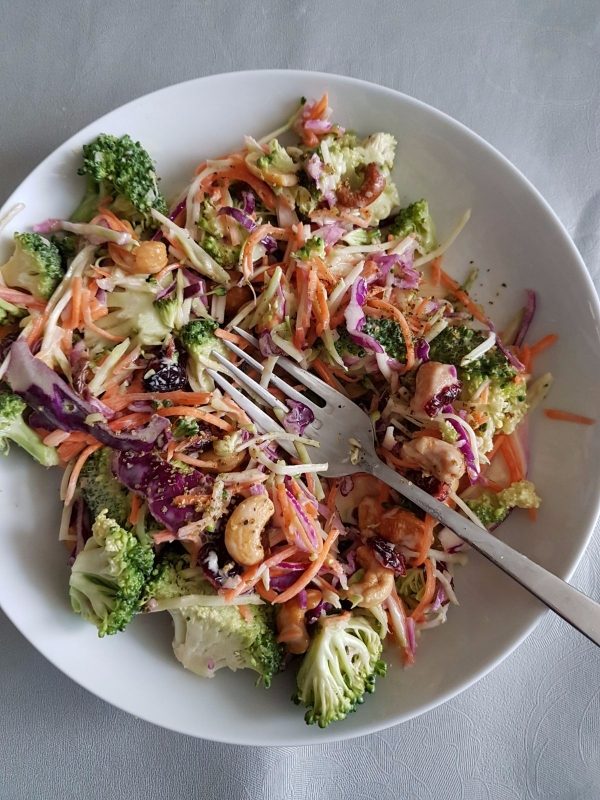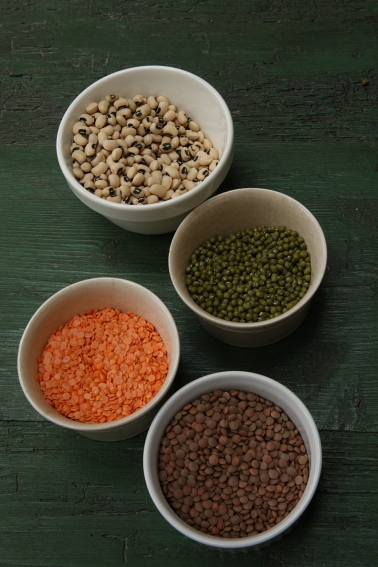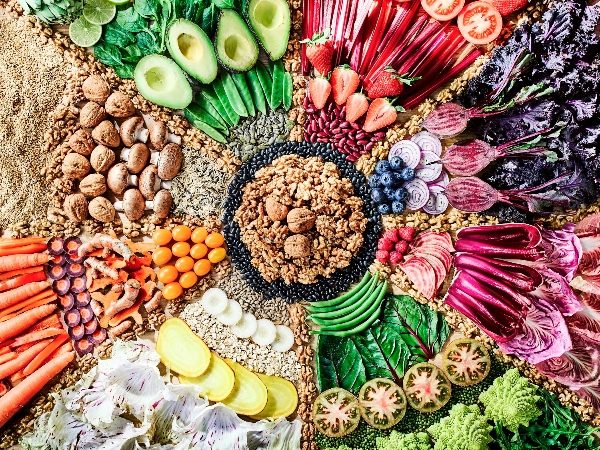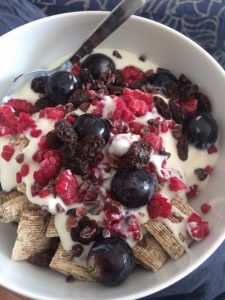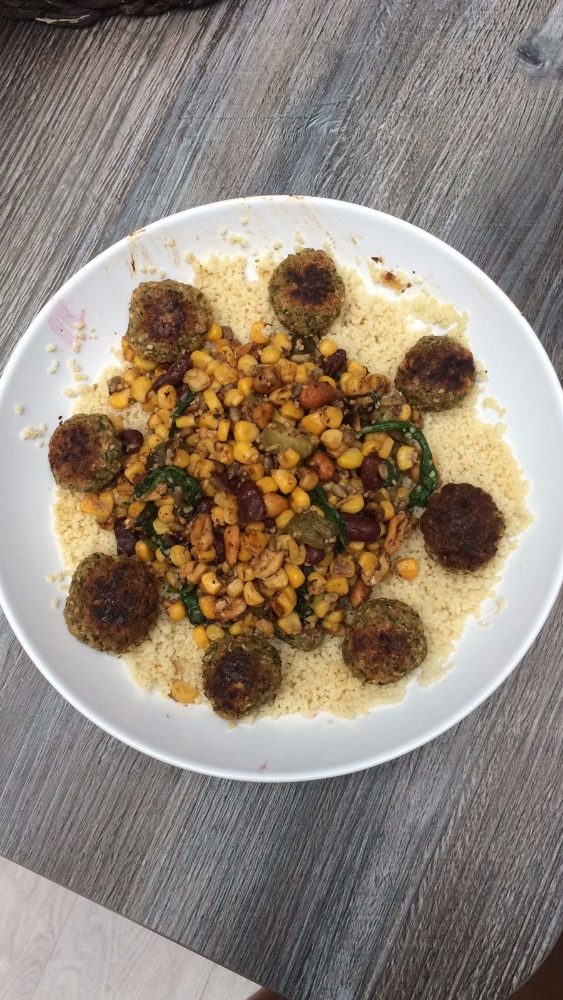Veganism is a growing trend. I’m seeing more and more young people, mainly women, who have concluded that this is the way to go, and whilst there’s nothing wrong with a vegan diet if it’s properly planned and includes a wide range of essential nutrients, I do have concerns. As far as I can tell, there’s a growing number of young people, especially girls, who choose to eat this way without having an understanding of nutrient needs, and often because the diet is so fibre-rich and filling, it can be hard for them to get enough calories into the day.
That’s one reason why I’m co-hosting a professional Twitter debate as part of the award-winning RDUK chats. We typically have around 50-80 participants on each chat and this gives you access to the latest thinking from registered dietitians and nutritionists in the field. Tune in for our Plant Power chat on Monday 7 August at 20.00BST by following @rdukchat. More on the chat.
Is it automatically healthier to be a vegetarian?
No! If you normally eat meat and then suddenly cut it out, you’re removing a whole range of nutrients that you need to put back in via other foods. And you could be eating vegetarian foods that are smothered in cheese or creamy sauces, or you may by buying processed veggie sausages and burgers that are likely to be high in salt.
However, a vegetarian diet which is well-balanced has been shown to be protective against certain diet-related conditions such as certain cancers, type 2 diabetes and heart disease.
Vegetarians and vegans are far more likely to eat at least five portions of fruit and vegetables a day, but just as likely to eat processed starchy foods, so it’s important to opt for whole grains where possible, such as whole-wheat pasta, wholemeal bread, and brown rice. Because meat is a good source of iron, there’s a chance vegetarians might miss out, but good alternative sources of iron are eggs, dried fruit, and fortified cereals. Best to make sure you have some vit C with your meal (e.g. a small glass of orange juice), as it enhances the absorption of iron. Walnuts and rapeseed oil are sources of omega 3 fatty acids, which are found mainly in oily fish.
What are the different types of vegetarian diets?
Vegetarians typically don’t eat poultry, meat, fish or shellfish, but within this there are different kinds of vegetarians.
- An ovo-vegetarian diet will include eggs.
- People following a lacto-vegetarian will eat dairy foods.
- A lacto-ovo vegetarian diet includes dairy foods and eggs.
- A vegan diet excludes all animal products.
- A pescetarian diet includes shellfish and fish.
- Flexitarians tend to base meals on vegetarian foods but are more flexible, so may include fish or other animal foods from time to time.
But isn’t meat just a better source of protein?
Meat can be very nutritious. It’s packed with protein, and gives you vitamin B12 and iron. It also provides more essential amino acids in one place than plant-based foods. For instance, to get the same range of amino acids found in a piece of chicken, we would need to combine more than one plant-based protein food. This is something we often do naturally, such as beans on toast, or dahl with rice. So long as you have a variety of plant foods over the course of the day, you should be able to get all your essential amino acids, even if you don’t eat different plant foods at the same meal.
Additionally, it’s a myth that we can’t get enough protein from plants – foods like lentils, beans and tofu are protein rich. You can get your essential amino acids by having a good mix of foods such as soya, quinoa, hemp, nuts and beans. The key is to make sure you eat enough protein, and to eat a mixture of different plant proteins so that the combination gives you all the essential amino acids your body needs every day.
Note that a supplement is meant to be used to supplement your diet, not to provide you with all your nutrients, so it’s best to try and get everything from a varied diet. Further, there are active phytonutrients in food that are more efficiently absorbed when they’re part of the food rather than in a supplement form.
So should we all be turning vegetarian?
In a word, no. Well-planned vegetarian diets are appropriate for all stages of life and have many benefits. Beta glucans from oats can help maintain normal blood cholesterol levels, and many plant-based foods that are rich in fibre can help you to feel fuller for longer. A plant-based diet that includes foods such as whole grains, fruit, vegetables, nuts, seeds and oats have been strongly associated with a reduced risk of certain types of cancer. The World Cancer Research Fund recommends that we eat more plant-based foods such as whole grains, fruit, veg, beans and pulses. Plant-based foods also tend to have a relatively lower energy density (calories per gram) than rich meat-based dishes, so they may help you watch your weight.
But healthy eating is all about balance and enjoyment, and there’s no need to go from one extreme to the other. Take it slowly and simply include more plant-based foods in your diet. I love the idea of Meat-free Mondays – it’s a step in the right direction. And remember to have variety: different colours, different textures, different foods.
Healthy examples of vegan eating
You need to be a lot more careful on a vegan diet, as you are cutting out nutritious vegetarian foods like eggs and dairy that provide key nutrients. A a vegan diet may not be appropriate for all stages of life and there is a lot of time, effort and knowledge required to sustain a healthy vegan diet within a busy lifestyle. Here are some tasty healthy ideas…
Breakfast: choose fortified breakfast cereal with dairy-free yogurt, nuts, seeds and berries.
Pick-me-up smoothies:
Main Meal: falafels made from pulses, couscous, lots of veg scattered with nuts. Serve with mixed salad and end with fortified dairy-free yogurt and chopped fruit.
Light snack ideas:
More info: https://www.bda.uk.com/foodfacts/vegetarianfoodfacts.pdf

